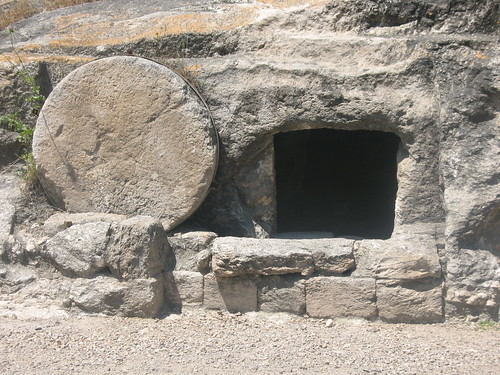We run our website the way we wished the whole internet worked: we provide high quality original content with no ads. We are funded solely by your direct support. Please consider supporting this project.
8 Arguments for the Reality of the Resurrection
James Emery via Compfight
As we come up on Easter many ask questions about the reliability of the resurrection story. Was it a legend? Did the early church fabricate it? Can we trust what we read in the Bible and what we hear preached?
Greg has written extensively on this topic. In his best-selling book Letters from a Skeptic, Greg responds to these questions:
____________________________________________
- The resurrection event is testified to by five independent sources (Matthew, Mark, Luke, John, and Paul — who referred to the numerous other sources as well, such as Peter and James and first Corinthians 15). …
- The location of Jesus’s tomb was well-known by all, so if Jesus had not risen from the dead, if his body were yet in the tomb, this could have been easily checked out. But Jesus’ followers (who would suffer persecution for their faith) and the opponents of Jesus (who would want to falsify the Christian claim) would have a motive for checking this out. But all agree, the tomb was empty. How is this agreement to be explained?
- Related to #2, no one disputes that the Christian church began in Jerusalem just a few weeks after Jesus’ crucifixion. It exploded in growth. And the content of the message that causes this explosion was that Jesus was the Messiah, the Lord of all, as was evidenced by his miracles and resurrection from the dead (see Acts 2:22–24). They do not present to their audience some unknown figure in the distant past. They’re talking about one of their audience’s contemporaries! How is this growth to be explained?
- The resurrection narratives lack the characteristics common to late legendary narratives, and embody many of the characteristics common to early eyewitness based reports. There is, for example, much detail, much of it being irrelevant to the storyline. To give one illustration, Mark mentions the name of the well-known member of the Sanhedrin (a Jewish councilman) who donated his tomb for Jesus — Joseph of Arimathea. Now if one is going to fabricate an account, one doesn’t create this sort of detail. One certainly doesn’t drop names of such prominent people, people who can easily be cross examined. …
- The conversion of Paul is unexplainable except on the basis he himself gives: he confronted the risen Lord (see Acts 9 and 1 Corinthians 15). Here was a man dead set against Christianity, even overseeing the stoning of one of its preachers, and then one moment he’s converted. Similarly, James, the brother of Jesus, was also a nonbeliever in Jesus until the Lord appeared to him (1 Corinthians 15:7). …
- Paul gives us an early list of the Resurrection appearances. It’s found in 1 Corinthians 15, written about 15 to 20 years after the resurrection. He is here attempting to convince some Corinthians that the resurrection of Jesus did in fact occur, and to do this he lists Christ’s appearances to the apostles, and to James, and “to more than 500 at the same time, most of whom are still living” (1 Corinthians 15:6). The thrust of noting the larger number of living people who saw Christ resurrected is to say, “If you don’t believe me, the evidence is still around. Go and ask those who saw it.” By the standard of any law court, this must be taken as strong evidence.
- There’s no way of accounting for the transformation of the disciples except on the basis of the resurrection, the very basis they themselves give. If you compare the disciples before the death of Jesus with the disciples after the resurrection appearances, you will see a world of difference. One day they are fearful and hiding; the next day they are facing hostile audiences, preaching the resurrection.
- Finally, there is no motive for the disciples to fabricate the story. They had nothing to gain and everything to lose. Nor is there anything to lead us to believe that they were disposed to fabricate such a story, or had the sort of characters which would be capable of such an incredible fabrication. Nor is there anything to suggest that they could have successfully pulled such an incredible fabrication off, even if they had wanted to.
In short, the denial of the resurrection has nothing to recommend itself as a historical hypothesis, while the admittance of the resurrection has everything to recommend itself as a historical hypothesis. (127-130)
Category: General
Tags: Apologetics, Easter, Letters from a Skeptic, Resurrection
Topics: Apologetics
Related Reading

Sermons: Resurrection Principle
Is the resurrection of Jesus true? The entire Christian faith rests on if is or not. In this short sermon clip, Greg Boyd goes through a few historical proofs as to why this is true. It is important to remember Christ’s resurrection and the meaning, purpose and principle behind it. In the full sermon, Greg…

Why Bart Ehrman Doesn’t Have to Ruin Your Christmas (Or Your Faith) Part 2
This is the second of several videos Greg put together to refute Bart Ehrman’s claims published in the article What Do We Really Know About Jesus? If you missed it, you can catch the first installment here.

The Cross Reveals God’s Love
The central way Christ functions as the perfect image and exact representation of God is by dying on the cross. While Christ’s entire life manifests the true God, Christ came primarily to die. It was his death that defeated the devil and freed us from bondage. The one who does what is sinful is of…

Podcast: Dear Greg: My Husband is Anti-Theist, What Should I Do?
A godly house with an unbelieving spouse. Greg discusses unbelieving partners. http://traffic.libsyn.com/askgregboyd/Episode_0418.mp3

Why Bart Ehrman Doesn’t Have to Ruin Your Christmas (Or Your Faith) Part 8
This is the eighth of several videos Greg put together to refute Bart Ehrman’s claims published in the article What Do We Really Know About Jesus? In this segment, Greg gets into the nitty gritty of why portions of the birth account are not the dumbest lie ever. If you missed the first seven installments you can…

Podcast: What Did Jesus Say and Do During the 40 Days After His Resurrection?
Greg talks about Jesus’ strange post-resurrection life. http://traffic.libsyn.com/askgregboyd/Episode_0439.mp3

